The Poetic Edda: A Study Guide
The Speech of the Masked One
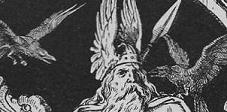
[PREVIOUS][MAIN][NEXT]
[HOME]
MS No. 2365 4to [R]
AM 748 I 4to [A]
Normalized Text:
Hrist ok Mist
vil ek at mér horn beri,
sceigiöld ok skögul,
hildi ok Þrvði,
hlökk ok herfjötur,
göll ok geirölul,
randgríþ ok ráþgriþr
ok reginleif;
þær bera Einherjum öl.
vil ek at mér horn beri,
skægg öld ok skögul,
hildr ok Þrvðr,
hlökk ok herfjötur,
göll ok geirömul,
randgríð ok ráþgríðr
ok reginleif;
þær bera Einherjum öl.
36. Hrist ok Mist
vil ek at mér horn beri,
Skeggjöld ok Skögul,
Hildr ok Þrúðr,
Hlökk ok Herfjötur,
Göll ok Geirölul,
Randgríðr ok Ráðgríðr
ok Reginleif;
þær bera Einherjum öl.
in Icelandic Poetry
“The Song of Grimnir”
The Yale Magazine, Vol. 16
“The Song of Grimner”
XXXVI.
Hrista and Mista,[1]
daily bear
Bowls that sooth the brow of care;
Ever Odin's chiefs regale,
With soul invigorating ale.
[1]
HRISTA and MISTA, these Goddesses are called Valkyries, Odin sends them into the
field of battle to make choice of those who are to be slain, and to bestow the
victory.
May Hrist and Mist, fair ones,
Fill for me the golden goblets with wine,
While Herfiötör, and other sisters ten,
With names as sweet, to happy Einheriar bear
Full bowls of sparkling sherry for their lips.
in Edda Sæmundar Hinns Frôða
“The Lay of Grimnir”
"Dits de Grimnir"
36. Hrist and Mist
the horn shall bear me
Skeggöld and Skögul,
Hlökk and Herfjötur,
Hildi and Thrudi,
Göll and Geirölul,
Randgrid and Radgrid,
and Reginleif,
these bear beer to the Einherjar.
| 36. Secousse, et
Brume, je Veux qu'elles me portent la corne; Manie-la-Hache, et Hérissée-de-lances, Chaîne, et Lien-d'armée, Occision, et Force, Tumulte, et Ivresse-de-lances, Fureur-de-boucliers, et Fureur-résolue, et Divinement-Glorieuse, Celles- là présentent l'aile aux Troupiers-uniques. |
Quake and Mist, I want them to bear me the horn; Handles-the-Axe and Barbed-with-spears, Chain and Fetters-of-Armies, Killing and Force, Tumult and Intoxicated-with-the-spear, Fury-of-shields and Determined-Fury, and Divinely-glorious, These bear ale to the Unique-Troopers. |
in Corpus Poeticum Boreale
“The Sayings of the Hooded One”
in Edda Saemundar
“The Sayings of Grimnir”
I will have Hrist and Mist (Walkyries) to give me the horn. S. and S. etc.; these serve ale to the Chosen Host.
(Then cries he from the fire-torment.)
36. Would that Hrist and Mist would bear me a horn!
my Valkyries, Axe and Spear-point,
Bond and War-fetter, Battle and Might,
Shrieker and Spear-fierce in strife ;
Shield-fierce, Counsel-fierce, Strength-maiden all
who bear ale to the Chosen in War.
in The Poetic Edda
“Grimnismol: The Ballad of Grimnir”
in The Poetic Edda
“The Lay of Grimnir”
36. Hrist and Mist bring the horn at my will,
Skeggjold and Skogul;
Hild and Truth, Hlok and Herfjotur,
Gol and Geironul,
Randgrith and Rathgrith and Reginleif
Beer to the warriors bring.
37. Hrist and Mist the horn shall bear me,
Skeggjold and Skogul;
but Hild and Thruth, Hlokk and Herfjotur,
Goll and Geironul,
Randgrith and Ráthgrith and Reginleif,[1]
to the einherjar ale shall bear.
[1]
The names of the valkyries indicate their warlike activities, like those of
"Völuspá," St. 30.
in The Elder Edda
“The Lay of Grimnir”
in The Poetic Edda
“Grimnir’s Sayings”
My ale-horn is brought me by Hrist and Mist:
Skegghold and Skogul,
Hildi and Hlokk, Herfjotur,
Thrudi, Goll and Geirolul,
Rangrid, Radgrid and Reginleif
Serve ale to the slain.
36. 'Hrist and Mist, I wish, would bear a horn to me,
Skeggiold and Skogul,
Hild and Thrud, Hlokk and Herfiotur,
Goll and Geirolul,
Randgrid and Radgrid, and Reginleif;
they bear ale to the Einheriar.
The Elder Edda: A Book of Viking Lore
'The Lay of Grimnir"
in The Poetic Edda, Vol. III: Mythological Poems
“The Lay of Grimnir”
36. ‘ I want Wielder and Mist to bring me a horn;
Axe-age and Brandisher,
War and Strength, Clash and War-bonds,
Smash and Spear-weaver,
Shield-truce and Counsel-truce and Power-truce:
they bring the Einherjar ale.
36. Brandish and Battle Mist
I wish to bring me a drinking-horn
Axe Age and Ankus,
Warfare and Force,
Clamour and War Fetter,
Yell and Spear [Strong]
Rage at Shields and Rage at Reason,
[Rooter Out* and] Ruler’s Heir—
they bring the elect fighters ale.
*"Róta ok: I have added these words before Reginleif, assuming a scribal omission in a seventh pair of Valkyrie names. Róta is given as a Valkyrie name in SnE 40 in the prose following the citation of Grímnismál 36, and could relate to the text that is lost."
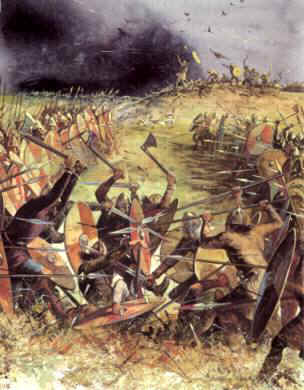 |
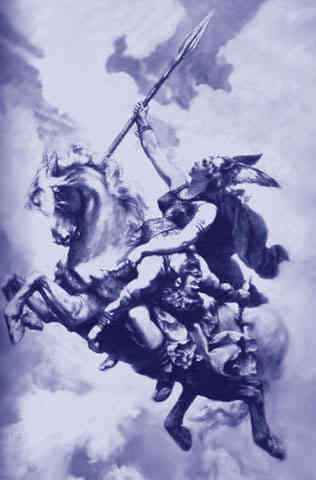 |
 |
|
Enn eru þær aðrar, er þjóna skulu í Valhöll, bera drykkju ok
gæta borðbúnaðar ok ölgagna. Svá eru þær nefndar í Grímnismálum: Þessar heita valkyrjur. Þær sendir Óðinn til hverrar orrustu. Þær kjósa feigð á menn ok ráða sigri. Guðr ok Róta ok norn in yngsta, er Skuld heitir, ríða jafnan at kjósa val ok ráða vígum. |
"There are also those others whose office it is to serve in Valhall, to bear drink and mind the table-service and ale-flagons; thus are they named in Grímnismál:
These are called Valkyrs: them Odin sends to every battle;
they chose men's fate and award victory. Gudr and Róta and the
youngest Norn, she who is called Skuld, ride ever to take the
slain and decide fights. |
Lists of Valkyries also occur elsewhere, primarily in Völuspá 30 (Codex Regius):
| Sá hon valkyrjur vítt um komnar, görvar at ríða til Goðþjóðar. Skuld helt skildi, en Skögul önnur, Gunnr, Hildr, Göndul ok Geirskögul. Nú eru talðar nönnur Herjans, görvar at ríða grund, valkyrjur. |
30. She saw Valkyriur coming from afar, ready to ride to the gods’ people: Skuld held a shield, and Skögul another. Gunn, Hild, Göndul, and Geirskögul. Now are tallied Herian´s maidens, ready to ride over the earth the Valkyriur. |
According to this verse, the Valkyries appear to be under the
leadership of Skuld, the youngest of the three Norns. Two more lists
appear as nafnaþular [Source]
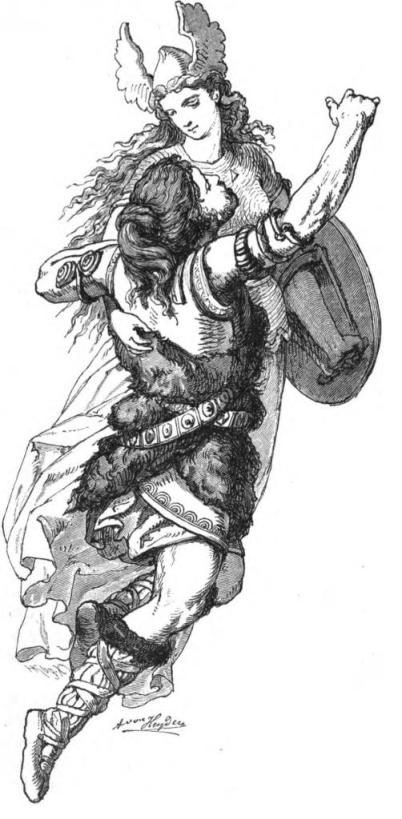 |
1 Vol. 3. Anonymous Þulur, 56. Heiti valkyrja, 1 — Þul Valkyrja 1, III
Skj: Anonyme digte og vers [XII]: IV. aaa. Heiti valkyrja 1 (AI, 689; BI, 678); fornyrðislag; ed. EG; group: B; mss: A; texts: Skm 579.
2 Vol. 3. Anonymous Þulur, 56. Heiti valkyrja, 2 — Þul Valkyrja 2, III Skj: Anonyme digte og vers [XII]: IV. aaa. Heiti valkyrja 2 (AI, 689; BI, 678); fornyrðislag; ed. EG; group: B; mss: A; texts: Skm 580.
|
The earliest appearance of Valkyries in Germanic literature is probably as Idisi in a 10th century German charm, since "the mentioned idisi in the First Merseberger Galder, who intervene in battle by way of magic paralysis, carry the typical qualities of the Valkyries", [Britt-Mari Näsström, Freyja—The Great Goddess of the North, 1995]. Most scholars now agree that the valkyries are counted among the beings called disir. Their action of binding men in battle with war-fetters is often compared to the name of the Valkyrie Herfjötur ('war-fetter') in this verse. Their presence typically symbolizes war or unrest.
Here the battle-maidens are identified as servers in Valhall. In Grimnismal 14, Freyja is also associated with the battle-slain, chosing half of the fallen for her hall. Like the Valkyries, Freyja serves beer in Valhall, notably when the giant Hrungnir arrives as a guest of Odin (Skáldskaparmál 34). On that occasion Freyja served him beer from Thor's horn. Once drunk, Hrungnir boasted of his plan to carry off Freyja, the sun and the moon, until Thor arrived and challenged him to a duel. The same giant is identified as the "robber of Thrud", Thor's daughter in the skaldic poem Þórsdrapa 16. Here, Þrúðr is listed among the Valkyries. Both myths likely refer to the giants' desire for not only the goddesses, but also the poetic mead.
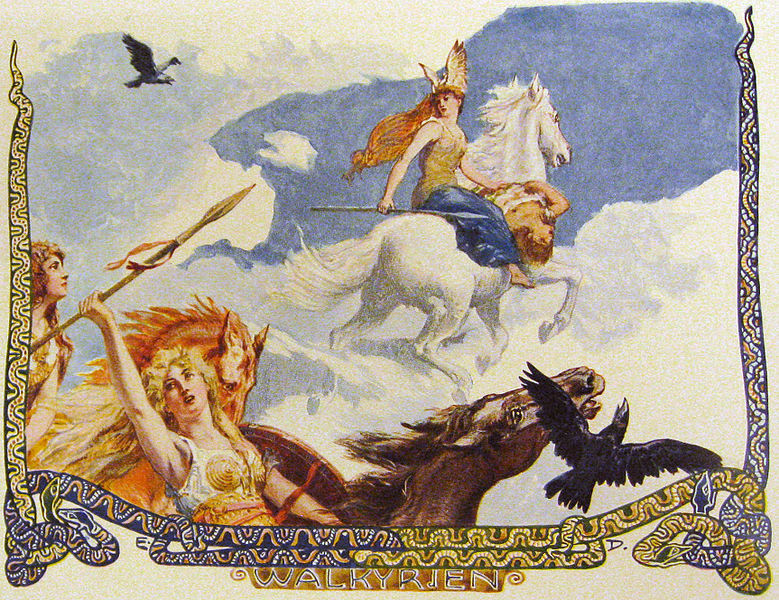
| The Valkyries of Grímnismál 36 |
Literal Translation | Frederic Bergmann 1871 |
Britt-Mari
Näsström 1995 |
Andy Orchard 2012 |
Ursula Dronke 2012 |
| Hrist | "to shake" | Quake Secousse |
"the shaker" | Wielder | Brandish |
| Mist | "mist" | Mist Brume |
"the mist" | Mist | Battle Mist |
| Skeggjöld | "axe-age" | Handles-the-Axe Manie-la-Hache |
"wearing a war axe" | Axe-age | Axe Age |
| Skögul: |
Barbed-with-spears Hérissée-de-lances |
"battle" | Brandisher | Ankus | |
| Hildr | "battle" | Killing Occision |
"battle" | War | Warfare |
| Þrúðr | "power" | Force Force |
"power" | Strength | Force |
| Hlökk | "sound of battle" | Chain Chaîne |
"noise" | Clash | Clamour |
| Herfjötur | "war-fetter" | Fetters-of-Armies Lien-d'armée |
"war fetter" | War-bonds | War Fetter |
| Göll: | "shriek" | Tumult
Tumulte |
"loud cry" | Smash | Yell |
|
Geirölul also Geirömul, Geirahöd |
geir="spear-" suffix uncertain |
Intoxicated-with-the-spear Ivresse-de-lances |
"spear battle"
[read Geirahöd after Snorri] |
Spear-weaver | Spear [Strong] |
| Randgríðr | Fury-of-shields Fureur-de-boucliers |
"shield peace" | Shield-truce | Rage at Shields | |
| Ráðgríðr | Determined-Fury Fureur-résolue |
"council peace" "gods' peace" |
Counsel-truce | Rage at Reason, | |
| Reginleif | Divinely-glorious Divinement-Glorieuse |
"heritage of the gods" | Power-truce | Ruler’s Heir |
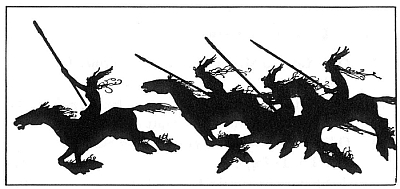
Comments on the Translations of the Names
| Les Valkyries étant les servantes du dieu des combats, leurs noms rappellent leurs fonctions guerrières. La Valkyrie Hrist (Secousse) personnifie l'action de secouer les armes ou les baguettes divinatoires (cf. norr. hrista teina), indices de l'issue du combat. Mist (Brume) est la personnification de la mêlée confuse, tempêtueuse, et embrouillée du combat,qui, sous ce rapport, ressemble au brouillard. Skogul (Hérissée de lances), Skeggiolld (p. Skeggi-vold, Manie la hache), Randgrid (Fureur d'écus), Geira-olul (Joute de Framées) désignent le combat avec les différentes armes offensives et défensives. Hlôck (Chaîne), et Herfiotur (Lien de troupe) désignent les chaînes qu'on mettait aux prisonniers de guerre, condamnés à l'esclavage ou au sacrifice. Beginleif (Protection des Grandeurs) désigne l'invulnérabilité et la protection invisible accordées, par les dieux ou Grandeurs, à quelque héros dans le combat. Hildur (p. Hvildur), dont le nom est emprunté à celui de la déesse Hildur, qui est un dédoublement de Hel, désigne la mort. Thrudur (Force) est la personnification de la valeur guerrière, et Râdgrîd (Fureur résolue) désigne la fureur qui, dans le combat, fait prendre des résolutions extrêmes. |
|
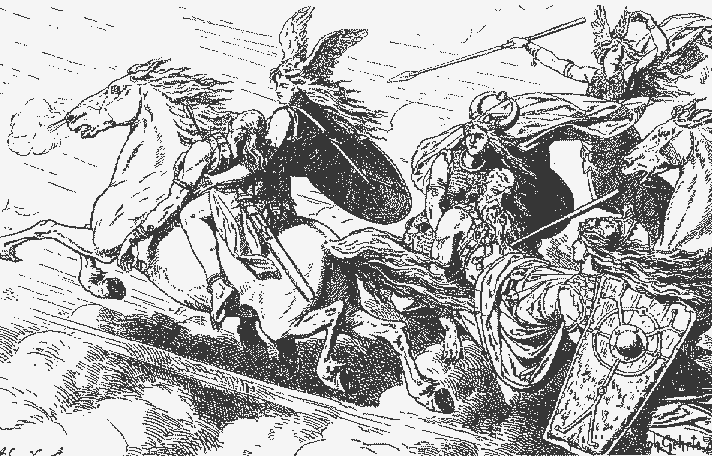
Hrist:
"to shake" [Cleasby/Vigfusson];
Hrist is used in kennings for 'warrior, man': Hristar Týr, of Merlin, Merl. II 14, and for 'battle': Hristar hríð, ESk. 1, 5, Hristar él, EGils 1, 34. [Lexicon Poeticum]
Mist:
"probably akin to the neuter mistr, as is to be inferred from mistar-marr, the mist-sea = the clouds, the airy region, Hkv. 1. 46 [Cleasby/Vigfusson];
In kennings, for 'battle': frost Mistar Ht. 61, gustr Mistar Ingj. 1, 2, mót Mistar Grettis. 20, (cf. mótkennandi), — for 'sword': Mistar laukr Ht. 85, Mistar glóð (glœðr) Páll., Mistar eldr Has. 2, Mistar linnr Has. 5 [Lexicon Poeticum]
Skeggjöld:
"from skeggja, u, f. a kind of halberd" (Cleasby/Vigfusson);
Also used as the name of the "Axe-age" that falls upon mankind before Ragnarök, Völuspá 45.
Skögul:
‘the one who towers high on horseback” (cf. skaga, ‘jut out’) and skögultann ‘fang’ [Sigurd Nordal, Völuspá];
In kennings, for battle: Skögular dynr Gldr 5, Skögular veðr Håk 8, Ht 54, for sword Sköglar eldr Rst 7, Skögular fúrr Ingj 2, 3, Skögular tandr Rst 20, — for shield: Skögular tjöld Hl 34 a, Skögular borð Rst 29, Skögular ský Þjsk 1, 2, Nj (XII) 7, — for mail-coat: Skögular kápa Krm 18, — for raven: Skögular gögl Giz sv 1.
The valkyries Göndul and Skögul (also called Geirskögul) appear in Hákonarmál, a poem by Eyvind Skáldaspillir, to accompany King Hakon to Valhall. Skögul and Geirskögul are both named in Völuspá 30.
Hildr:
name of a Valkyrie in Völuspá 30, and Grímnismál 36; Hildr is also represented as a daughter of the mythical king Högni and the bride of Héðin, whose life is recorded in the tale of Hjaðninga-víg, Edda 89, 90: hence war is called Hildar-leikr, m. 'the game of Hildr', Bm. 1, passim"; "II. in proper names; it is rare as a prefix in northern names, but frequently in old German: of men, Hildir, Hildi-björn, Hildi-brandr, Hildi-grímr, Hild-ólfr; of women, Hildr, Hildi-gunnr, Hildi-ríðr: again, it often forms the latter part in female names, and often spelt or sounded without the aspirate, Ás-hildr, Bryn-hildr, Böðv-ildr, Dóm-hildr, Ey-ildr, Geir-hildr, Grím-hildr, Gunn-hildr, Hrafn-hildr, Matt-ildr (for.), Orm-hildr, Ragn-hildr, Svan-hildr, Úlf-hildr, Yngv-ildr, Þor-hildr, Landnamnabók [Cleasby/Vigfusson]
"a Valkyrie in Vóluspá 30, Grímnismál 36, þula IV 2, Darraðarljóð 3, men hjaldrs Hildr stendr und rauðum skildi "Finngálkn (11th century)". In kennings, for battle: Hildar leikr Bjark 2, Krm 13, Þjóð A 3, 2, Hildar leikmildr ESk 6, 70, Hildar hlemmidrifa Ht 54, Hildar hregg Korm Lv 30, Hildar él Edáð 3, Hildar veðr GDropl 4, Hildar hjaldr Húsdr 1 (cf. hjaldrgegnir). [Lexicon Poeticum]
Hildr is also named among the valkyries in Völuspá 30.
Þrúðr:
"the name of a goddess, the daughter of Thor and Sif, Edda; also the name of a woman, Þrúðr; as also in compounds, Her-þrúðr, Sig-þrúðr, Jar-þrúðr, Landnabók; cp. the Germ. drude = a witch or evil fairy, Grimm's Dict. s.v., used in some old poëtical compound words referring to Thor: Þrúð-hamarr, m. the master hammer of Thor, Ls. 57: Þrúð-heimr, Þrúð-vangr, m. the name of the mythical abode of Thor, Grímnismál 4, Edda: þrúð-valdr, in þrúðvaldr goða, the heroic, doughty defender of the gods, i.e. Thor, Hárbarðsljóð." [Cleasby/Vigfusson];
"Thor's daughter, Þula IV h 2, faðir Þrúðar, Thor, EVald 2, þrámóðnir Þrúðar, Þórsdrapa 17; The giant Hrungnir is designated as þjófr Þrúðar, Þórsdrapa 1 (whereby one should conclude that it was Hrungnir who kidnapped her); likely identical to the person listed among Odin attendant maidens, Grímnismál 36." [Lexicon Poeticum]
Hlökk:
"genitive (thus in compounds) Hlakkar, [perh. akin to Anglo-Saxon hlanc, English lank = thin, slender] [Cleasby/Vigfusson]
Hlökk, 'clang', the peculiar 'sound of weapons' or 'clash of battle', thus battle in general, geirvalds hlökk, Odin's clang, StjO II 7; the word became personified as the Valkyrie Hlökk, cf þula IV h 4, aaa 1, this applies then equally as the example of Hildr, (goddess); In kennings, for battle, Hlökkar veðr HolmgB 4, Hlökkar drifa HolmgB 6, Hlökkar él Hfr Lv 14, Hlökkar mót Vell 16 [Lexicon Poeticum]
Herfjötur:
"a mythical term, 'war-fetter:' a valiant man who in the stress of battle feels himself spell-bound, and unable to stir, was in old lore said to be caught in a 'war-fetter;' this was attributed to the weird sisters of battle (the Valkyries), as is shewn by the fact that one of them was called Herfjöturr, 'Shackle', Edda (Gl.); they were the messengers of Odin, by whom the warriors were doomed to death (kjósa val); the passages referring to this lore are Fms. viii. 170, Sturl. ii. 233, Ísl. ii. 104 twice (Harð. S.) :-- a similar belief appears in the Greek, see Od. xxii. 297 sqq., Iliad xiii. 358-360, xxii. 5 sqq. [Cleasby/Vigfusson]
"valkyrie-name (she 'who chains, binds, the hosts, warriors' with death)" [Lexicon Poeticum]
Göll:
göll, f. a shriek, Edda (Gl.) 110. [Cleasby/Vigfusson]
göll, f, clang, noise, göll geira, battle, Gisl 8, ESk 6, 52, göll ståls Hl 15 b. [Lexicon Poeticum]
Geirölul:
Geirömul, valkyrie-name, Þul IV aaa 1, Grímnismál 36 (written -ra/lul, R and -römul A) accordingly 'the one with spears emerging' [Lexicon Poeticum]
"GEIRR, m. [Anglo-Saxon gâr; Hel. gêr; OHG. keir, whence kesja, q.v.; cp. also Lat. gaesum, a Teut.-Lat. word] :-- a spear, Edda 41, Fms. i. 177, Hm. 15, 37, Hkv. 1. 15, Hbl. 40; Odin is represented wielding a geir, called Gungnir, as are also the Valkyries; marka sik geirs-oddi, to mark oneself in the breast with a spear's point, so as to make blood flow, was a heathen rite whereby warriors on their death-bed devoted themselves to Odin; it was the common belief that a man who died a natural death was not admitted into Valhalla after death; this rite is only mentioned in mythical Sagas such as Yngl. S. ch. 10; cp. also Gautr. S. ch. 7. -- þá stakk Starkaðr sprotanum á konungi ok mælti, nú gef ek þik Óðni: the origin of this rite is in Hávamál, where Odin himself is represented as hanging on the tree Yggdrasil 'wounded with a spear and given to Odin, myself to myself;' some trace it to a Christian origin, which is not very likely. Again, the cruel blóðörn ('blood-eagle') is no doubt connected with this kind of sacrifice to Odin. II. a personal name, and also in many compds, Sig-geirr, Þór-geirr, Ás-geirr, Vé-geirr (the holy spear), and Geir-hildr, Geir-ríðr, Geir-mundr, Geir-laug, Geir-röðr, and many others [Cleasby/Vigfusson]
Randgríðr:
"randar-, from rönd, a shield, whence also are formed the poëtical compds, rand-álfr, -berendr, -ullr, -viðr, = a warrior; rand-él, -fár, -óp, = battle; rand-áll, -gálkn, -hængr, -laukr, -linnr, -ormr, = a sword; rand-garðr, -hvel, -láð, -völlr, = a shield. 2. personal names of men, Rand-verr; of women, Rand-eiðr, Fms.; Rand-gríð, one of the Valkyries, Grímnismál 36." [Cleasby/Vigfusson]
"The giantess (Gríðr) of the shield" or "shield-destroyer" [Lexicon Poeticum]
Ráðgríðr:
"RÁÐ, n. [Danish raad; Old English reed; German rath], 'rede' counsel, advice" [Cleasby/Vigfusson]
"GRÍÐ, f. frantic eagerness; í gríð, eagerly: gríðar-liga (gríðu- liga, Mag. 99, Ed.), adv. eagerly: gríðar-ligr, adj. eager." [Cleasby/Vigfusson]
The final suffix in the names Randgríðr and Ráðgríðr is sometimes read as -grið, “peace”, instead of –gríð, “eager”.
Reginleif:
REGIN, n. plural only in nomative and accusative:-- the gods as the makers and rulers of the universe, the word being peculiar to the ancient poems; regin heita goð heiðin, bönd ok rögn, Edda ii. 430: frequently in the Völuspá, þá gengu r. öll á rökstóla, ginnheilög goð, 6, 9, 27, 29; ...II. in personal names, Reginn, a mythical name, Edda, Völsunga Saga: especially in compounds, Regin-leif, a feminine name, Landnabók., but mostly contr. Ragn- or Rögn-: of women, Ragna, Ragn-heiðr, Ragn-hildr; of men, Ragnarr, Rögn-valdr, Landn.; cp. old Germ. and Saxon names beginning with Ragin-, mod. Rain-, Rayn-, Ran-, as Reginald, Reynolds. In Compounds, mighty, great: regin-djúp, n. the deep sea. regin-djúpr, adj. mighty deep, Vísna bók 1612. regin-dómr, m. pl. the mighty doom, the last judgment, Völuspá 64. [Cleasby/Vigfusson]
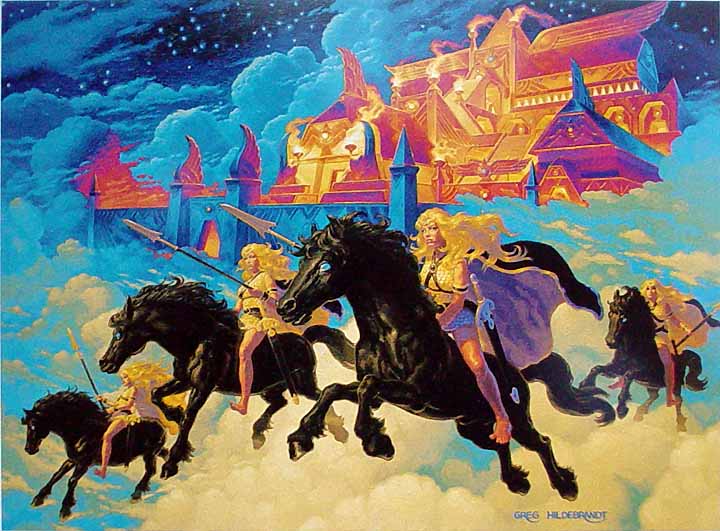
"In the 11th century, the Anglo-Saxon bishop Wulfstan noted what he called 'choosers of the slain' (wælcyrge) among witches and evil-doers on his list of sinners in his Sermo Lupi. This is an example not only of Christian demonizing of the pagan world, but of the widespread and popular perception of those dieties whose function was to decide between life and death on the battlefield.
"Like the Disir, the Valkyries form an indistinct group of female deities with a close connection to the battle-field. They belong to the sphere of Óðinn and Freyja, who share the dead on the battlefield. Like Freyja they choose among the men who are going to die. They reflect the cruelty of death, but also the joyful life on the other side when welcoming the fallen heroes to Valhall."
[PREVIOUS][MAIN][NEXT]
[HOME]